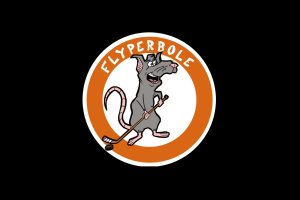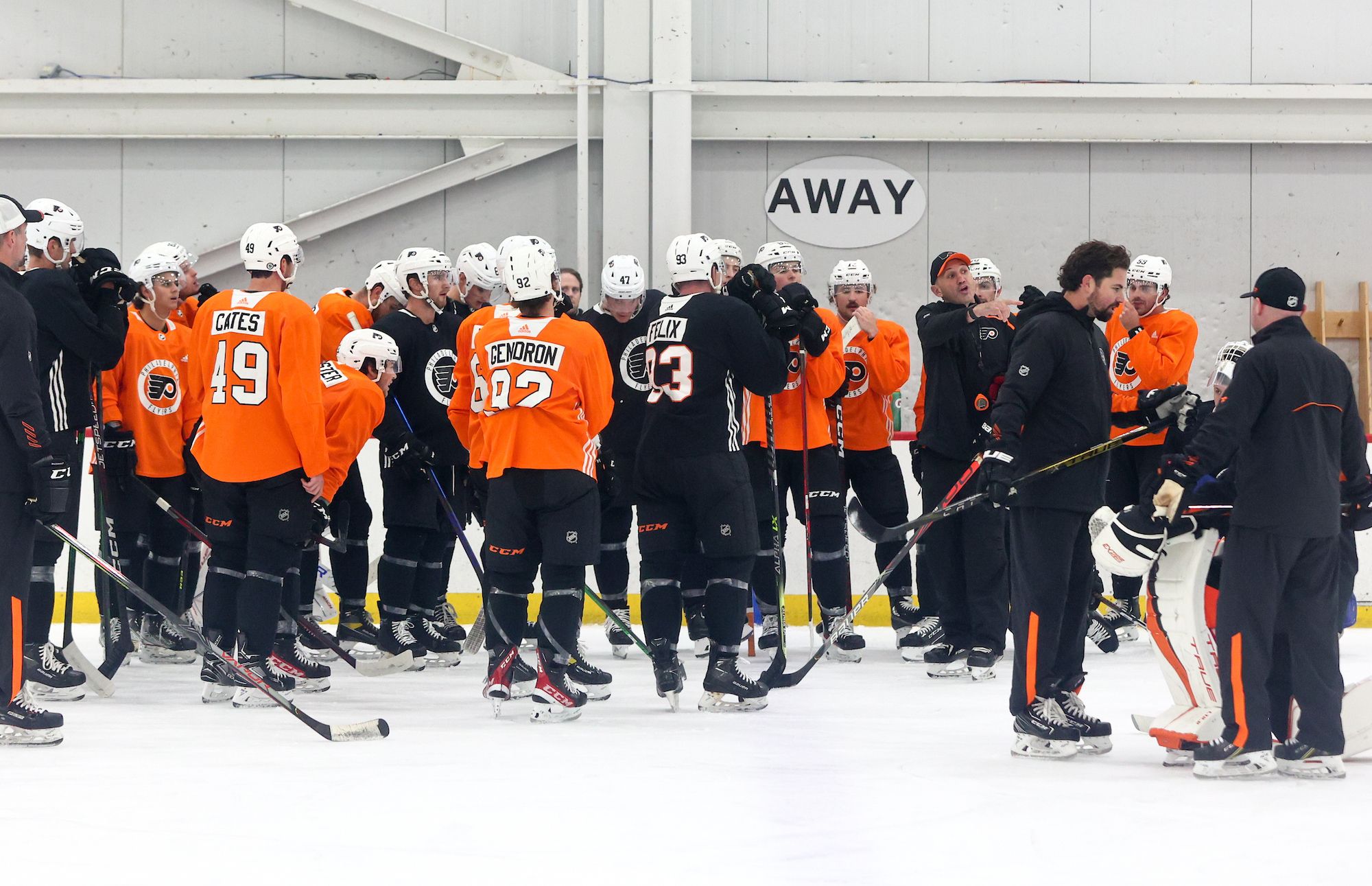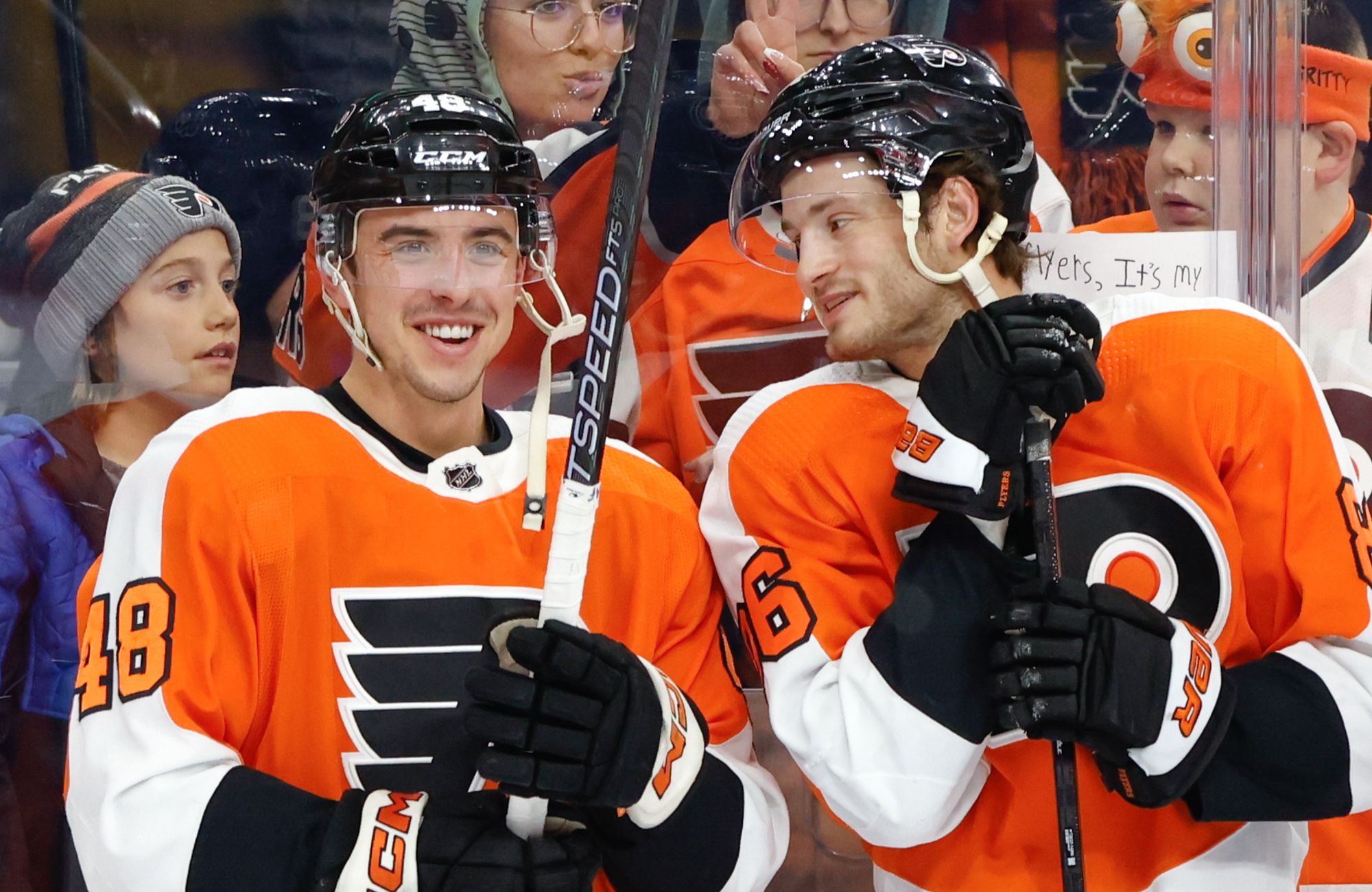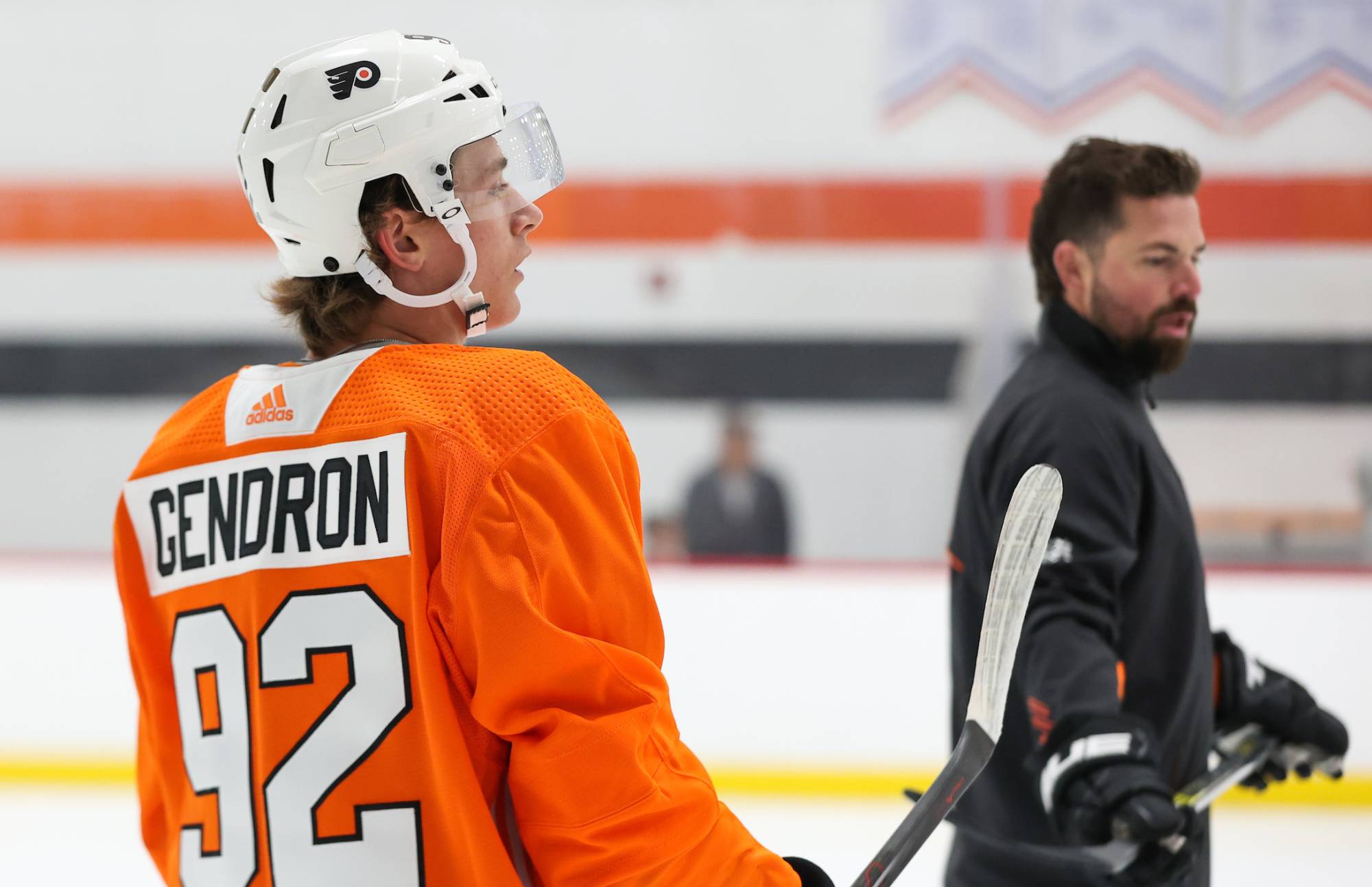Morning Observations is a feature where we break down the previous night’s game with an analytical eye.
- Going into last night’s game, we knew that Colorado was the worst puck possession team in the NHL, and it became quickly obvious why that is. The Avalanche seem obsessed with generating offense via transition rushes, but they don’t utilize heavy defensive zone pressure in order to get the puck moving in the other direction. Instead, they collapse in front of their goaltender, looking to prevent teams from getting into the slot and trying to block shots from the outside. Once a shot is disrupted, they immediately send a forward racing up ice for a stretch pass behind the defense. The strategy can create high quality rush chances, but it also gets them buried against a sustained cycle attack that can get shots through via quick passes to create open lanes. That’s how the Flyers eventually took control of the contest, as Philadelphia’s most creative players were given lots of space in the offensive zone to take shots and make plays. The result was 45 shots on goal and a much-needed victory.
- Still, a 13-minute stretch of absolutely awful hockey nearly destroyed Philadelphia’s chances at a win. From the 9:26 mark of the first period through the first four minutes of the second, the Flyers generated only three shot attempts at even strength, an anemic display. The primary cause was terrible passing and puck control in the neutral and offensive zones. Despite Colorado playing a passive defensive style, the Flyers repeatedly made unforced errors, which allowed the Avalanche to quickly transition back up ice and create chances of their own. Philadelphia was essentially playing right into their opponent’s hands. But following Nick Holden’s goal that gave the Avalanche a 1-0 lead, the Flyers’ execution improved dramatically, and they began exploiting the holes in the Colorado defense. From that Holden’s goal through the end of the game, Philadelphia won the shot attempts battle 48-19, and the goals battle 4 to 1. The Avalanche’s even strength system has real flaws, which isn’t helped by the overall weakness of their defense. The final 36 minutes showcased the damage a team with a great forecheck and creative forwards can do to Colorado.
NHL.com Report and Highlights | War-On-Ice.com Report | HockeyStats.ca Report | ExpectedGoals (xG) | HockeyViz.com | BSH Recap | Meltzer’s Musings
- Through the first half of the season, Philadelphia was a team that lacked forward depth, forcing the top two lines centered by Claude Giroux and Sean Couturier to carry the load by themselves. Probably the biggest reason for the team’s surge since February has been their newfound scoring balance. Last night, three different lines potted goals, and the only line that was kept off the scoresheet finished solidly above-average in terms of puck possession metrics. The resurgent fourth line (which welcomed back Chris VandeVelde) started the fun, as Pierre-Edouard Bellemare deflected a Shayne Gostisbehere shot past Semyon Varlamov to tie the score at 1-1. Then, after Colorado had retaken the lead, Radko Gudas scored with the help of second-line forwards Sean Couturier and Jakub Voracek and knotted the game up again. Not about to be outdone, the top unit of Giroux, Simmonds and Schenn responded just 19 seconds later with the game-winner. Even the Nick Cousins line was far from a liability despite failing to score, as Cousins finished with a strong 61.9% Corsi For percentage. Dave Hakstol is now able to roll all four lines, keeping the forwards fresh and making it more difficult for opponents to dictate matchups. It’s been huge, especially for a team dealing with a particularly demanding schedule.
- John Mitchell’s third period goal could have been a backbreaker for the Flyers. After all, they had dominated the period to that point, and had sent relentless pressure for the preceding twenty minutes of hockey. With Semyon Varlamov having a great game, and Philadelphia facing its fourth contest in six days, it would have been very easy for the players to become demoralized after all of their hard work had done nothing except put them back in a one-goal deficit. Instead, the Flyers kept coming, fully understanding the importance of the game’s outcome. If the players were tired, they certainly didn’t show it. Philadelphia outshot Colorado 19 to 9 in the final stanza, and totally deserved to come away with the victory as a result.
- The term gets overused in the hockey media, but this truly was a gutsy performance by Flyers goalie Steve Mason. He was all that kept the Avalanche from taking total control of this game during the 13-minute stretch of totally ineffective play on the part of the skaters. He allowed one goal, but it could have easily been three or four if not for Mason’s heroics. Due to the Flyers’ resurgence in the game’s second half, Mason faced little rubber the rest of the way, but he again had to come up huge after Colorado pulled their goaltender with only a few minutes left. He even fought through what appeared to be a tweak of his knee to make multiple tricky saves and keep Philadelphia in front. Obviously, with Michal Nevuirth out for the remainder of the regular season, Mason’s health is of paramount importance for the Flyers and their chances of making the postseason. It might be a smart idea to give Anthony Stolarz his first NHL start on Saturday night against Arizona if Mason is even a bit banged up — the Coyotes might be the weakest offensive team left on the schedule, and three-day break for Mason certainly couldn’t hurt.
- There’s been some talk over the past week about Shayne Gostisbehere being in a slump, considering the fact that he had gone four games without a point. While there’s an obvious explanation for a possible slump — Gostisbehere is weakest when in his own end without the puck, and his current defensive partner prefers to allow opponents easy entry into the defensive zone while trying to keep them to the outside — the criticism really was never all that fair. Ghost was still creating chances, both at even strength and on the power play, but the shots just weren’t going in. That changed last night, as Gostisbehere earned a primary assist on Bellemare’s tally for the defenseman’s 40th point of the year. Really, the whole game was a showcase for the 22-year old, considering Colorado’s passive defense in their own end. Giving the Ghost Bear space to create chances is a misguided tactic, as he is not afraid to carry the puck into high-danger areas via his elusive skating ability. I suspect when Gostisbehere was watching pre-game tape of the Avalanche’s preferred tactics, he was licking his chops for this one, and it showed.
- Like all Flyers skaters he improved as the game progressed, but Mark Streit really dug himself a hole with a terrible first period performance. He was the chief offender when it came to poor breakout passes into the neutral zone, and even the team’s improvement in the latter stages of the game could not push his Corsi For percentage over 50 percent (he finished at 48.57%). In addition, he nearly scored on his own goalie during an early penalty kill, as he rang an attempted pass around the boards right off the post alongside Steve Mason. All defensemen will have random bad games at even strength — sometimes, they fight the puck or don’t have their skating legs. More concerning is Streit’s struggles on the penalty kill. His shot suppression metrics are among the worst on the team, and his skillset (strong on breakout passes and in the offensive zone) doesn’t exactly translate naturally to penalty killing situations. Unfortunately, it’s either Streit or Brandon Manning as the fourth defenseman on the PK depth chart with Michael Del Zotto out for the year, and neither are particularly strong options.
- Radko Gudas‘ recent run as a sniper for the Flyers has been as enjoyable as it has been unexpected. But perhaps we should have seen this coming, to a degree. Over the past three seasons, Gudas actually ranks 9th among all NHL defensemen in even strength shots on goal per sixty minutes, in the same vicinity as guys like Jake Muzzin, Victor Hedman, Alex Edler, and Dougie Hamilton. The shots simply weren’t going in for him. Now some of that is true talent — it doesn’t seem like Gudas has high-end accuracy with his shot, as there’s surely a reason why the Flyers have kept him off their power play despite lots of velocity. But the volume has always been there, and over time, bounces will start going a player’s way. The bounces have just happened to come in bunches for Radko Gudas recently.
- Jakub Voracek was elevated back up to the Flyers’ second line as wing for Sean Couturier, but it was Sam Gagner who dropped in the lineup, not regular left wing Michael Raffl. The Austrian forward responded with a quintessential Michael Raffl game — not flashy, no points, but just good old-fashioned hard work in the corners and in puck battles. Raffl isn’t much of a playmaker, and his scoring touch is inconsistent. But there’s a reason why Hakstol kept him up on that line with Couturier and Voracek. He’s fantastic at keeping cycles alive, creating space on rushes in the neutral zone, and providing backchecking support on defense. Raffl finished with the best Corsi For among Flyers forwards last night, posting a 63.64 percent. If you pay close attention to him for an entire game, it becomes easy to see why he’s such a strong possession player. He may not create goals, but he creates more situations for the goal-creators to work their magic.
- Scott Laughton was the odd-man out in this one, as Chris VandeVelde checked back into the lineup to reunite the “Untouchables” line of himself, Pierre-Edouard Bellemare and Ryan White. Dubbed “The Untouchables” by Bill Matz of Sons of Penn, it’s a reference to the fact that Dave Hakstol has kept the line together longer than any other combination this season, an odd feat for a team’s fourth unit. VandeVelde actually was the only member of the trio who was kept off the scoreboard last night, as the line was very effective in limited minutes. This was a good matchup for them, facing off against a Colorado team with a weak defense susceptible to the cycle game — the Untouchables’ biggest strength. I suspect that Hakstol is open to bringing Laughton back in the lineup if the VandeVelde-Bellemare-White trio ever starts to lag in their intensity, but intensity really has never been the problem for them this season, which is why Hakstol kept them together for so long. Right or wrong, Laughton may find it difficult to fight his way back into the lineup now.









